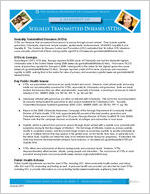The Georgia Department Of Community Health
A SNAPSHOT OF
Sexually Transmitted Diseases (STDs)
Sexually Transmitted Diseases (STDs)
STDs are diseases that are passed from person to person through sexual contact. They include syphilis, gonorrhea, Chlamydia, chancroid, herpes simplex, genital warts, trichomoniasis, HIV/AIDS, hepatitis A and hepatitis B. The Centers for Disease Control and Prevention (CDC) estimated that 19 million STD infections occur annually, almost half of them among youths aged15 to 24 (www.cdc.gov/std/stats08/trends.htm).
STDs in Georgia
According to CDC's STD data, Georgia reported 42,629 cases of Chlamydia and had the thirteenth highest Chlamydia rates in the United States during 2008 (www.cdc.gov/std/stats08/tables/2.htm). There were 16,272 cases of gonorrhea reported for Georgia in 2008, ranking sixth in the nation for the highest gonorrhea cases (www.cdc.gov/std/stats08/tables/12.htm). Georgia reported a total of 914 cases of primary and secondary syphilis in 2008, ranking third in the nation for rates of primary and secondary syphilis (www.cdc.gov/std/stats05/ tables/24.htm).
Key Public Health Issues
STDs are preventable and several are easily treated and cured. However, most adolescents and young adults are not adequately screened for STDs, especially for Chlamydia and gonorrhea. Both are easily treated, but because they are often asymptomatic, especially in females, screening is necessary to detect infection (CDC, MMWR 2006; Vol. 55/ No. RR-11, pp. 38 and 42)
Individuals infected with gonorrhea are often co-infected with Chlamydia. This led to the recommendation for persons being treated for gonorrhea to also receive treatment for Chlamydia (CDC. Sexually Transmitted Diseases treatment guidelines 2006; (CDC, MMWR 2006; Vol. 55/ No. RR-11, pg. 43)
Based on the 2008 Chlamydia Awareness Campaign of the Georgia Department of Community Health, Division of Public Health, STD Unit, approximately 96 percent of the total positive gonorrhea and Chlamydia tests were in those aged 18 to 25 years (Georgia Division of Public Health/STD Unit, 05/08). Please note that the campaign focused on students at colleges and universities in local areas
Syphilis, which is passed from person to person through direct contact with a syphilis sore, presents with symptoms during its first two stages of infection. The first stage of infection, known as primary syphilis, results in a painless sore(s), and the second stage, known as secondary syphilis, is usually noticeable by a rash or multiple lesions that may appear in the genital area, on the hands, feet, face, or generally over the whole body. Syphilis can infect the baby of an infected woman during her pregnancy. If untreated, the child may become developmentally delayed, have seizures, or die (www.cdc.gov/std/syphilis/STDFactSyphilis.htm)
STDs affect men and women of diverse backgrounds and economic levels. However, STDs disproportionately affect women, infants, young people and minorities. The occurrence of STDs is most prevalent among teens and young adults (www.cdcnpin.org/scripts/std/std.asp)
Public Health Actions
Public health departments can test for most STDs, including HIV. Most community health centers and clinics offer HIV and STD counseling and testing as well. A personal health care provider can also test for most STDs, including HIV, or provide information on a local testing facility (www.knowhivaids.org/tested_facts.html).
2 Peachtree Street, Atlanta, Ga 30303 www.dch.georgia.gov
January 2011
A Snapshot of Sexaully Transmitted Diseases (STDs)
Costs
Based on CDC's 2008 STD data, the direct medical costs associated with STDs in the United States are estimated at $15.9 billion annually (www.cdc.gov/std/stats08/trends.htm).
RESOURCES
Websites: Centers for Disease Control and Prevention (CDC) www.cdc.gov/std/ Georgia Department of Community Health, Division of Public Health, STD Unit www.health.state.ga.us Hotlines: CDC National STD and AIDS Hotlines 800-232-4636 (800-CDC-INFO) or 919-361-8488 National Herpes Hotline 919-361-8488 Call the Georgia AIDS/STD Hotline at 800-551-2728 to receive information on where to go for confidential and/or anonymous STD/HIV testing in Georgia.
